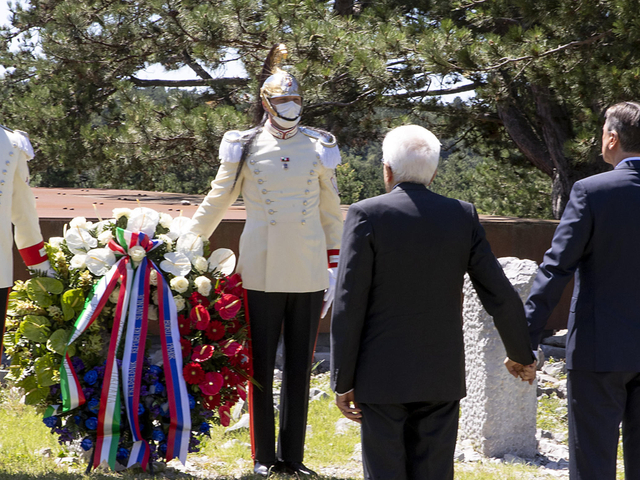
(by Francesco De Filippo) (ANSA) - TRIESTE, 14 LUG - It was predictable that the meeting would be a historic event in the long path of reconciliation between Italy and Slovenia that began ten years ago. The atmosphere of sincere friendship between the Italian president Sergio Mattarella and the Slovenian Head of State Borut Pahor was predictable, given the cordial relations and given that it was the fifteenth meeting for them. But that holding hands, that happened twice in the unreal silence on the Trieste Karst in front of the places that admonish and remind us of the atrocious suffering on both sides of the border, was not foreseeable. As if to say: from this stance there is no going back. Pacification is not forgetfulness. "History cannot be erased, and the painful experiences suffered by the people of these lands are not forgotten," said President Mattarella. But there is a solution and its name is "sense of responsibility." The visit could not resolve all the controversy between the two countries. The Second World War caused deep wounds in the bodies of both peoples, so we must proceed quickly. The visit had several stops: the meeting in the Piedmont Cavalry Regiment barracks at Villa Opicina, then immediately the tribute paid to the great foiba of Basovizza: it is estimated that about 2,000 Italians were thrown into it, including civilians and military personnel. Here the two presidents stood hand in hand for a few moments; immediately afterward, the visit to the memorial stone in remembrance of four members of the Tigr (Trst Istra Gorica Rijeka) shot on 6 September 1930 in the execution of a death sentence issued by the Special Court for the defense of the state. On the way back, both presidents were visibly 'touched'. Mattarella and Pahor then descended from the Karst to the city, to the Prefecture, where they finally gave two (short) speeches and sanctioned the transfer of ownership of the Narodni dom to the Slovenian Italian community. The only surviving witness of the fire started a hundred years ago that destroyed the "Casa del Popolo", the Italian Slovenian-speaking writer Boris Pahor, 107 years old in August, could not miss the ceremony. The two Presidents visited Narodni dom, then a had quick business breakfast and then Pahor left for Ljubliana. President Mattarella instead met with the associations of exiles. He guaranteed his commitment to "solicit a thorough, free, complete historical research". But there will be no reward for those who lose everything. "That is impossible," he said, but a strong effort will be made to "alleviate the negative consequences of what happened to our fellow citizens," he added. Italian political leaders did appreciate the meeting. The leader of the Salvini League spoke of an event that "gets justice for many women and men who paid with their lives the 'guilt' of not being communists." Even more enthusiastic about the meeting were the DEM MPs Serracchiani and Rojc (who represents the Slovenian community in Italy). The president of Fratelli d'Italia, Giorgia Meloni, on the other hand, underlined "the bitterness for the wrong equation between the Italian soldiers and the four Tigr terrorists with the tribute paid to the stone of Basovizza requested by the Slovenian government." (ANSA).
